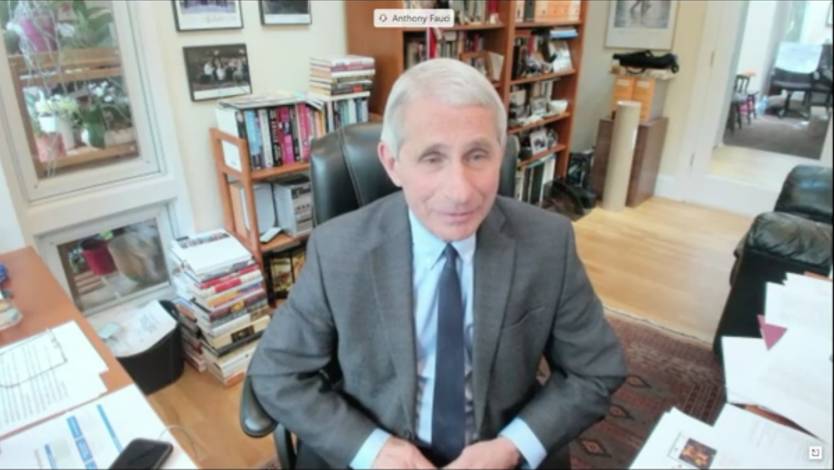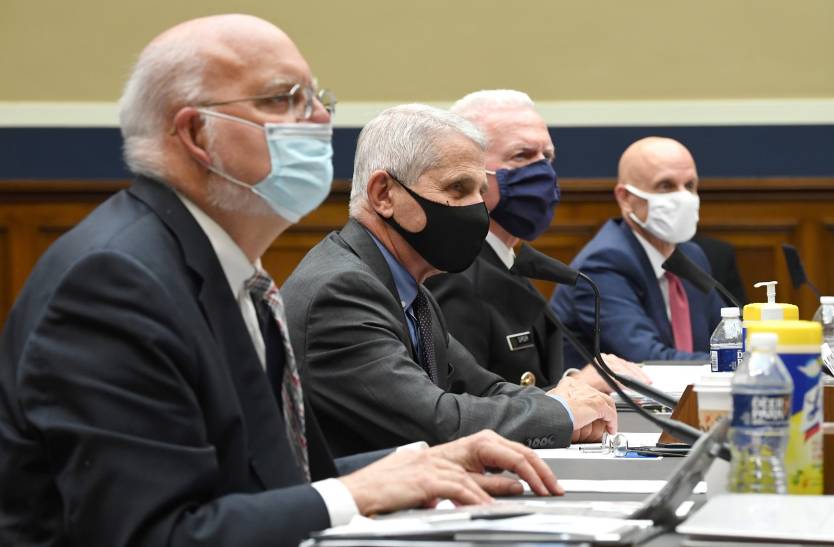- Dr. Anthony Fauci offered various coronavirus prevention tips in a new interview, explaining how he has been reducing his own risk of infection.
- The nation’s top infectious disease expert addressed testing, the use of face masks, shopping, meeting with other family members, as well as other activities of everyday life that have been altered by the pandemic.
- The advice Fauci gives can be followed by anyone looking to reduce the risk of catching COVID-19. The only thing Fauci does that other people cannot is get tested frequently, which is mandated by his close proximity to Trump.
Dr. Anthony Fauci, director of the National Institute of Allergy and Infectious Diseases (NIAID), is one of the most trusted faces of the US government’s response to the novel coronavirus. He has appeared in official White House press briefings, he testified in front of Congress several times to provide updates about the COVID-19 response strategy, and he appeared in countless interviews to explain America’s progress at combating the epidemic. But, at 79 years old, Fauci is in the at-risk category, so he’s taking several precautions to reduce his own risk of infection.
Regular testing
The infectious disease expert doesn’t have the same safety apparatus built around Donald Trump, but he does benefit from it. We explained that Trump feels confident about avoiding face masks in public even though he’s terrified of the disease, all because of the many precautions the White House is taking to shield him from infection. One of them is having the people he comes in contact with tested regularly. And Fauci is tested every time he goes into the White House, he told The Washington Post. That’s not a luxury that regular Americans necessarily have, but it’s a tool available to public officials who can’t isolate because of the nature of their job.
Face masks
Fauci said that face masks dominate everything he does. He had to explain a few weeks ago why the government had to lie about the effectiveness of face masks in the early months of the pandemic. That’s because the US did not have enough PPE for medical personnel, so it tried to prevent a run on the supplies. But now Fauci is a staunch defender of face masks:
The only time I don’t wear one is when I am alone, when I am home with my wife, or when I am speaking in public — provided there is 6 feet between me and the people to whom I am speaking, as was the case when I answered questions at the recent Congressional hearings.
Fauci also said he doesn’t wear a mask if he’s alone in the office. “But I slap one on if I walk out into the hall and could pass someone, like my assistant, who also wears one.”
In a later reply, Fauci explained that on the rare occasion he and his wife have people over, they wear masks unless they’re eating. And then they sit out in the open at least six feet apart, and they do not share anything. They never invite more than two other people into their home, and those people must also be taking precautions of their own. Aside from that, the only person that comes to his home is a cleaning lady every two weeks. She wears a mask and gloves at all times while inside the house.
The doctor explained that he wore a mask when he went for a haircut, as did the woman who cut his hair. He scheduled an appointment in the early morning and nobody else was there. He said he always wears a mask when going to the grocery store as well.

Seeing family
One of the problems with lockdowns and restrictions is that many people haven’t seen their loved ones for weeks or months. That’s because no amount of love will eliminate the risk of transmission. Fauci’s family is no different:
My middle daughter, who teaches school in New Orleans, drove up here after they closed the schools. She could teach online from here, so she thought: Why not come home and see her parents? When she got here she went straight through the back entrance into the basement. She stayed in our basement, which has a room with a bed, a shower, electricity, and she did not come upstairs for 14 days. My wife brought food down to her on paper dishes. She lives in a very high risk city, and she wouldn’t let us near her. I wanted to hug her when she arrived, but she said: ‘No way, dad.’ She came upstairs after 14 days, and then stayed with us for several months.
He also addressed protests later in the interview, saying that his daughters feel very strongly about social injustice. Still, they would not likely want to join an in-person protest or go to a political rally now.
Shaking hands and hugging
Fauci also said that “it’s going to be a while” until he considered shaking hands or hugging and kissing someone. “The infection rate will have to be extremely low or nonexistent, or we have to have a vaccine. Right now, I don’t even think about doing it.”
Shopping
Fauci said he goes to the grocery store and to drug stores regularly, but he tries to do it at odd hours that account for his schedule:
I do physically go to the grocery store, but I wear a mask and keep my distance. I usually go at odd times. I spend half the day alone in my office, and I’m part-time at the White House. In the late afternoon or evening, when I’m finished with the White House, I go shopping for groceries, or to drugstores. I don’t disinfect the bags. In general, I will take the materials out of the bags, then wash my hands with soap and water, and then use Purell, and let everything sit for a day.
He later added that he and his wife do not eat at restaurants, inside or outside. They do get takeout, however. When ordering out for him and his guests, “we always do takeout and I tell the takeout people that I want the food in four separate plastic containers, so no one has to touch anyone else’s food. Everyone’s food is self-contained.”
When it comes to mail and packages, the doctor said he used to take precautions with deliveries. “But now I just bring the mail in, wash my hands, then let it lie around for a day or two before I open it.

Flying and commuting
Fauci said he’s absolutely not going to get on a plane anytime soon. The same goes for public transportation:
I’m 79 years old. I am not getting on a plane. I have been on flights where I’ve been seated near people who were sneezing and coughing, and then three days later, I’ve got it. So, no chance. No Metro, no public transportation. I’m in a high risk group, and I don’t want to play around.
Gyms and other sports
Fauci said he wouldn’t go to a gym because he needs to be very careful and doesn’t want to “take a chance.” Instead, he swims at home in his pool and any other physical activities take place outside:
I do power-walking with Chris. I was running until about a year ago, but every time I went running, my back would tighten up the next morning. So now I walk the same distance. It just takes longer. We go every day with few exceptions, 3.5 miles per day during the week, four miles over the weekend. Prior to covid-19, I did it at lunch alone in the parks near NIH. Now, I do it in the evening with Chris around the neighborhood. On the weekends, Chris and I do it together on the C&O canal.
Going to the doctor
Fauci avoids routine trips to the doctor or dentist but said he might check in at some point in the next few weeks with his physician to treat his throat, “since I have a hoarse voice from so many briefings and interviews.” He said he’d advise others, including family members, to avoid procedures even as important as routine mammograms for the time being.
Back to school
Would Fauci send his young kids back to school in the fall had he had any? He said it depends on where you live, without elaborating on the matter.
The Post
spoke to several other health experts who answered the same set of questions, including Elizabeth Connick (chief of the infectious diseases division and professor of medicine and immunobiology at the University of Arizona), Paul A. Volberding (professor of medicine and emeritus professor of epidemiology and biostatistics at the University of California at San Francisco), Linda Bell (South Carolina’s state epidemiologist), Barry Bloom (Jacobson research professor and former dean of the Harvard T.H. Chan School of Public Health), and David Satcher (former US surgeon general, and former director of the Centers for Disease Control and Prevention). The full roundup is available at this link, and it’s definitely worth a read.








